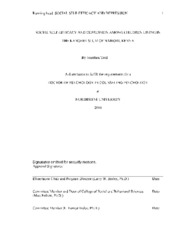| dc.contributor.author | Troll, Jonathan | en |
| dc.date.accessioned | 2017-07-13T16:31:34Z | |
| dc.date.available | 2017-07-13T16:31:34Z | |
| dc.date.issued | 2014 | en |
| dc.identifier.uri | archives.northwestu.edu/handle/nu/25066 | en |
| dc.description.abstract | Social self-efficacy plays an important role in one's psychological well-being, and a low sense of social self-efficacy is often associated with depression. But, does the relationship between social self-efficacy and depression hold true when measured among some of the world's most impoverished children and adolescents? The researcher analyzed the correlation between depression and social self-efficacy among children and adolescents (N=63) living in the Kangemi slums of Nairobi, Kenya and hypothesized that a negative correlation would be found between the two variables. The researcher also analyzed the correlation between depression and social self-efficacy in both conflict and non-conflict situations and hypothesized that a negative correlation would be found between depression and social self-efficacy in only non-conflict situations. Consideration was given to gender differences. Data were collected using Wheeler and Ladd's Self-Efficacy in Peer Interactions and Kovacs' Children's Depression Inventory. Results from the study indicated a significant negative correlation between depression and social self-efficacy among children living in Kangemi, p =.008. A negative correlation was also found between depression and social self-efficacy in non-conflict situations, p =.026, but no correlation was found between the variables in conflict situations. Therapy and/or didactic instruction are important aspects to raising social self-efficacy and, given the proper training, Hamomi's staff are in a position to give such assistance. Bandura stated that self-efficacy is the byproduct of one�s confidence and that a prosocial orientation reduces one's susceptibility to depression. Evidence now indicates that this is true for the young people of Nairobi's slums as well. | en |
| dc.format.extent | 80 pages | en |
| dc.format.medium | PDF | en |
| dc.language.iso | en | en |
| dc.publisher | Northwest University | en |
| dc.rights | This original work is protected by copyright. Copyright is retained by the author(s). Works may be viewed, downloaded, or printed, but not reproduced or distributed without author(s) permission. | en |
| dc.rights.uri | http://archives.northwestu.edu/page/copyright | en |
| dc.title | Social Self-Efficacy and Depression Among Children Living in the Kangemi Slum of Nairobi, Kenya | en |
| thesis.degree.name | Doctor of Psychology in Counseling Psychology | en |
| thesis.degree.level | Doctoral | en |
| thesis.degree.grantor | Northwest University | en |
| thesis.degree.discipline | College of Social and Behavioral Sciences | en |


 Maintained by the Northwest University Library
Maintained by the Northwest University Library